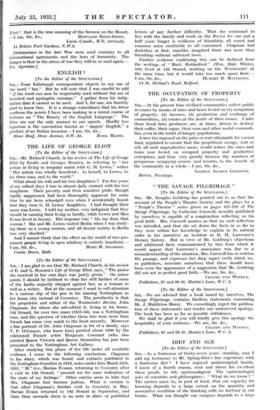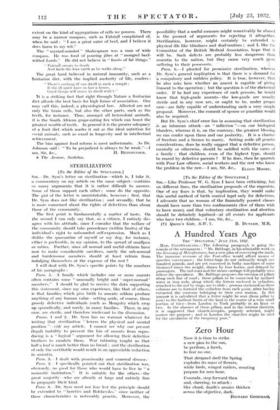DIET AND AGE
[To the Editor of the SPECTATOR.] SIR,—As a fruitarian of thirty-seven years' standing, may I add my testimony to Mr. Spring-Rice's fine experience with a fruitarian diet ? I have enjoyed uninterrupted health. I know of a fourth reason, over and above his excellent three proofs, to wit, epistemological. The epistemologist asks of scientists and philosophers : "What do we know ? " The answer must be,. in part at least, that our capacity for knowing depends to a large extent on the quantity and associative condition of the thinking cells we harbour in our brains. What our thought can compass depends to a large extent on the kind of aggregations of cells we possess. There may be a narrow compass, such as Falstaff complained of, when he said : "I am a great eater of beef, and I believe it does harm to my wit."
The " myriad-minded " Shakespeare was a man of wide compass. He was fond of pouring jibes at "mongrel beef- witted Lords." He did not believe in "feasts of fat things."
" Falstah sweats to death
And lards the lean earth as he walks along."
The great bard believed in natural immunity, such as a fruitarian diet, with the implied austerity of life, confers:
"There's nothing ill can dwell in such a temple : If the ill spirit have so fair a house, Good things will strive to dwell with't."
It is a striking fact that right through Nature a fruitarian diet affords the best basis for high forms of association. One may call this, indeed, a physiological law. Affected are not only the brain cells, but also the other parts, such as the teeth, for instance. Thus, amongst all heterodont animals, it is the South African grape-eating fox which can boast the greatest wealth of teeth. In general it is the greater adequacy. of a fruit diet which marks it out as the ideal nutrition for social animals, such as excel in longevity and in intellectual achievement.
The bias against food reform is most unfortunate. As Dr. Johnson said : "To be prejudiced is always to be.weak."—I















































 Previous page
Previous page